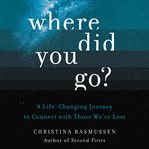ONE Two men and a truck are all it takes to finish us. The last of our furniture disappears out the front door and into the dark cavern of the bailiff's trailer. It's my bed, the one I shared with Nick for almost twenty years, a queen-sized mattress now in the hands of two burly men with tattoos and ponytails. They curse for the fifth time on this early-May morning and push the pillow-topped Tempur-Pedic slab into the last remaining space while Emma and I watch from the porch. Mattresses are so stable when they're horizontal, much less so when you tip them on end. They flop and bend; they want to curl in on themselves. Maybe that's a metaphor I should remember. Maybe mattresses are like marriages. Or husbands. Emma shudders as she watches the truck's rear doors slam shut, severing us from everything we own. "It's really gone, isn't it?" she says. I don't know whether she's talking about our stuff, the house, or the world outside. In any case, she's right. Sixteen years old is old enough to know. "Yeah. All gone to shit." I pull her close and sip the last of my instant coffee, cold now. No microwave to heat it up. I could probably put the mug in the oven. By some miracle, the gas is still on, but I don't know whether it will be tomorrow. No money changes hands before the men drive off. This move isn't on me; it's on the bank. Or the IRS. Or the credit card companies. Anyway on someone, somewhere, who still has a pot to piss in. They even took our kitchen pots and pans, a full set of All-Clad stainless. "Restaurant quality," Nick had said when he brought the box home on our last anniversary. "Nothing but the best for my girl." One of the moving men hefted a paella pan and made a comment when he thought I couldn't hear. The boxes with the All-Clad went into the truck's cab. We should hit the road soon, Emma and I, to get a start before the crowds turn our local Safeway into a kind of organized human zoo. If the past two weeks are anything to go by, the lines will already stretch a block by noon. The pushing and shoving and crying of I was here first will have started by eight in the morning. While I get two backpacks from the hall closet, I run through a list of where we might head next. The front seat of my Mazda roadster would have been all right, uncomfortable as it sounds. Cramped and sticky, but all right. Someone came for it a week ago, minutes after our mobile phones made their last calls and texts. So the car won't do. With gas at twenty bucks a gallon-and that was last week when the pumps were still flowing-the Mazda wasn't really a car anymore, only a couple of leather seats on wheels, a static jumble of metal and wires that wasn't going anywhere. It was a car in name but not in function, like a clock with all the right parts that no longer tells time. Which is fine, I guess, since I have no idea where there is to go. One of those last calls I made was to our local YMCA. We'd been members since Emma was born so she could use the pool. Sixteen years of seventy-five dollars a month should have been worth something-a cot or a yoga mat in the corner of the Pilates room. Use of the showers and towels, the same ones Beatrice, the massage therapist, used to drape carefully over my limbs when she worked on me. Nobody answered the Y's phone, so I tried Emma's high school. Then the local shelter. Then the zoo as a last resort. The zoo. It sounds worse than it is. There were a few rooms there, emergency pit stops for veterinarians who needed to monitor the primate house. They had beds and bathrooms and functional kitchenettes. And that holy of holies-air-conditioning. Again, no answer. Robert picked up on his cell, though. He sounded tired when he told me they were down to a skeleton operation, enough to oversee the animal transfers to another state before the feed ran out and the prize fauna resorted to cannibalism. "How's Bunny?" I asked. "He's okay. All the primates are confused but okay. Look, Miranda, I'm up to my ears here in paperwork." At least you still have a job, I thought. "Any chance I can have one of the spare rooms next week? Just for a few nights. They're coming for the furniture on Wednesday." I hated the desperation in my voice. I hated it more because I already knew the answer. "Miranda, we might not be here next week." And he was right. The zoos, like the schools and the YMCAs and the shelters and everything else that depended on public funding, were on what the bastards in Washington were calling "temporary hiatus." They still are. This isn't the way I expected to spend my forty-first birthday, wondering what Emma and I will do from one day to the next, coming inches closer to painting a sign that says Will work for food. When I think of last year, of Nick bringing me breakfast in bed and showering me with two dozen yellow roses, I die a little on the inside. The flowers were a teaser; my real present wasn't the roses or the new KitchenAid stand mixer in ruby red or the iPhone XX. No, Nick went all out for the big four-oh and bought me a Porsche cabriolet. "You deserve it, Miranda," he told me after he led me out the back door. What he didn't tell me was that he'd siphoned the last of our liquid cash to make the down payment. Plus, Nick did a few other shitty things behind my back, like remortgaging the house. Twice. I don't know how many days it will be before the bank takes the house and we end up on the road, me and my gal. Nick took a different road, one that ended on the last day of April when he set off for the North Carolina Smokies in his car, texted me an "I'm so sorry, babe," and drove the Maserati coupe off the side of a mountain. It couldn't have been fun for him, but I have a hard time feeling sympathy for a man who saw an easy way out and took it, leaving us with no car, no furniture, and no cash. I went to identify the body when I still had the Porsche, scraping together the last of my crappy severance pay to fill its tank with gasoline. There was barely enough for the trip out and back after the gas prices tripled. Airfare would have been more affordable-if we were talking about airfare a year ago or my bank account a few months back, but we're not. We're talking about now. When I got to Asheville, I had to sign a form releasing Nick's car to the insurance company. The good news was that his Maserati was paid off. The bad news is that we're still waiting for the insurance to pay up. I'm so sorry, babe. As if that could fix things. As if that could undo the damage. "Fucking men," I say, staring out into the street as the truck drives away with my life inside of it. "Fucking men," Emma says. I don't bother correcting her. Sometimes you need a little trash mouth. Sometimes the situation calls for it. I could kill every single one of them, starting with Nick, continuing with Robert, and ending with the tattooed assholes who stole my kitchen pots. TWO Nick used to say that when humans get into deep shit, when the pain becomes so bright it burns, when every last part of everything seems to worsen with each second, people want their mothers. Am I one of those people? Yes and no, and no and yes. And somewhere in between. I wish I had a mother right now, or at least some motherly construct, a woman to lean on. A lap or a shoulder. Hands to brush the hair from my eyes and tell me it will all be okay. I'm tempted to squeeze Emma close to me, but it's too hot for hugging, as if Mother Nature herself is against even this small intimacy. Emma is plugged into her iPhone as I count out the last of our cash. I sold my XX version the day our accounts were canceled-it was a smart move, and it's kept food in the house. But I couldn't take Emma's, not once I suspected how deep this rabbit hole was going, and I counted on hocking my engagement ring. Unfortunately, I counted a little too long-by the time I worked up the courage to ask for a quote, no one had any cash left. As she bobs her head along to her music and wanders from room to room around the house, her shoulders a little straighter without the heavy pack she'll be carrying when we return, I follow her. But only in body. In mind, I'm moving backward. To the day I married Nick Reynolds. Or Nick the Dick, as my mother called him when she was in a good mood. Mom didn't come to the service, a ten-minute exchange of words in the circuit court with Nick in a black leather bomber jacket and black jeans, a dot-com entrepreneur's version of a suit. The clerk stood behind a lectern as she recited and called out "Next!" before Nick had a chance to kiss me. So I guess Mom didn't miss much. "So you did it, Miranda," Sal Rubio whispered when she signed her name on the forms next to Nick's brother Pete's scrawl. "You married the bad boy." "I guess she did," Nick said, curling an arm around my waist. "And this bad boy's gonna take care of her until the day she dies." He planted a kiss on me outside the courthouse. "Who's coming for drinks? On me." Sal tagged along, mostly, I think, because she felt sorry for me. She sure as shit didn't feel anything for Nick. Two minutes after we got to the bar, Pete started putting the moves on her. "I'm immune, honey," Sal said, and dragged me off to the ladies' room, that sanctuary for all things girl talk since we were in the first grade. "You happy, girl?" "I'd be happier if my mother had showed up." "You know what I mean." Sal puckered up in front of the mirror and ran a glossy red gash across her lips. It was her trademark color. The only problem with it was that the lipstick, combined with the gold band on her left fourth, acted like a magnet for any man on the lookout for a no-strings-attached fling. You could say it was counterproductive. "Me, I wouldn't trust a man as far as I could throw him. Just don't let him run everything, okay?" I promised, and Sal kissed me full on the lips, an old habit. "I gotta roll, Miranda. Date in an hour with Ingrid." She tapped her phone, held it up, and snapped a selfie of us in the bathroom of the Barking Dog. It was my only wedding photo. "Who's Ingrid?" "Tall, Swedish, and gorgeous," she said, blowing a lock of red hair from her eyes. And with that mystery solved, she wiped the lipstick smear from my face and hustled out the door, boots clicking on the tile. I spent the rest of my wedding afternoon listening to Nick and Pete hash out deployment plans for their latest app, something they called BearHug. It was supposed to guarantee double-digit returns in the stock market. And for a long time, it did. The wedding evening went better than the wedding afternoon. Once Nick tore himself away from his brother, he drove us into the city and treated me to the biggest steak I'd ever seen. "Get used to it, babe," he said when my eyes nearly popped out of their sockets. "I said I'd take care of you." My mouth waters just thinking about that steak, glistening with butter, charred on the outside, pink and perfect in the center. The baked potato on the side needed its own plate. A real meat-and-potatoes kind of person, you used to say when you were talking about someone simple, unpretentious, down-to-earth. The only people who have been eating steak for the past few months are anything but. I wonder if the president gets steak in whatever bunker he's holed up in. Probably he does. So we stuffed ourselves full of three courses and downed two bottles of Veuve Clicquot. "La Grande Dame," Nick said, "just like my bride." Then we drove home, got to business for the first time as husband and wife, and cozied up on the sofa with popcorn in time to see my mother on the television. "Turn it off," I said. "Are you kidding? She's a riot." Nick held the remote out of reach, finally burying it under the cushion he was sitting on. "I mean, like, a certifiable riot." Mom was all of that. Tonight she was on some stage in San Francisco-her excuse for not being there for me when I tied the knot-opining about all things Femdom. She didn't seem to get that her group's pet name was in the Urban Dictionary as a category of sadomasochistic female-domination porn. Or maybe she did. Maybe that was the whole point. Mom-Win Somers to every other human-had the crowd roaring. She needed to pause after every few words just to let the applause die down. When she spoke, she seemed to be glaring out of the screen, her eyes boring a hole into Nick. He cuddled closer. "Man, she's on fire tonight." If she were any more on fire, our house would have burned down. "Do we have to watch this?" I said, pushing the popcorn away. By twenty-two, I'd had all the indoctrination into modern feminism a girl could take. Don't get married. Don't get pregnant. Don't let a man anywhere near your money. Blah blah blah. Nick ignored me. "Some women," Mom said, quieting the audience. The cameras cut away from her, showing a full house at whatever arena she'd picked for tonight's show. "Some women still don't get it. So let me say it again: We are living in a patriarchy." Only she didn't say "patriarchy"-she pronounced each syllable with a pregnant pause in between; it came out like pay-tree-ar-key. "And you know what, girls? All you have to do is switch that first letter to an H. What do you get then?" She raised her arms, a classic Win Somers gesture to get the crowd going, to stir them up into a froth of excitement. A frenzy. "What do you get then?" Excerpted from Femlandia by Christina Dalcher All rights reserved by the original copyright owners. Excerpts are provided for display purposes only and may not be reproduced, reprinted or distributed without the written permission of the publisher.



